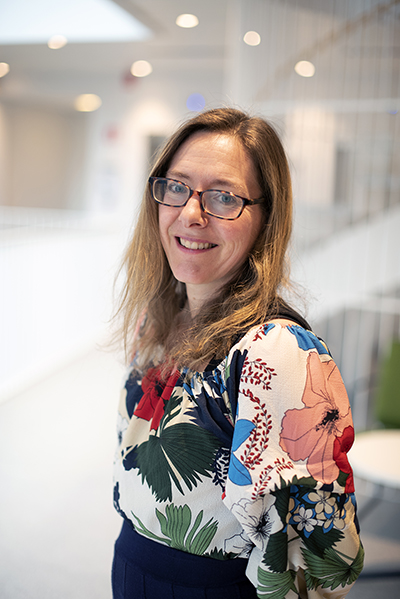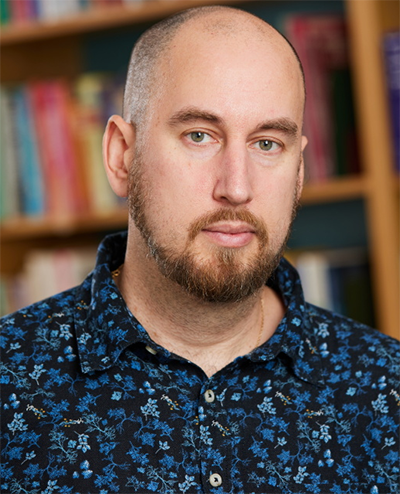Request a literature search – an easy way to increase the quality of research
Letting librarians perform the literature search for your research is a relatively new and free-of-cost service that KTH Library offers KTH researchers. It is a simple and effective way to increase the quality of your research. In this article you will find an interview with two researchers who have used the literature search service.
"I could not have done it myself"

Andrea Eriksson has been an associate professor at the Department of Ergonomics since 2016 and mainly researches leadership, and social and organizational work environment.
In 2020, Andrea contacted KTH Library to see what support was offered in literature searches, with focus on systematic searches. It coincided with the launch of KTH Library's new service to offer researchers systematic literature searches . Many library employees specialize in making structured searches in databases that cover KTH's various topics.
How did it come about that you ordered a literature search?
- I was quite aware of the fact that this is something you should spend time and energy on. It's probably common to do it fast and with your left hand, figuratively speaking, due to both a lack of time and skills. You just use references you already have. But I really think that researchers would benefit from spending more time on this.
- In some contexts, we as researchers must do systematic searches because it is required by the client, but in general, all research is made better by a more in-depth literature search.
- When I contacted the library, I received quick help, and the search was done within a week.
What do you think became different compared to you if you had done the literature search yourself?
- I could not have done it myself. It's the whole iterative process where several people provide added value. You discuss keywords, search strings, strategies, and get input on the whole process.
- An important part is that we who supervise and teach also need to guide our students in these matters. Although, they can get help from the library as well.
What worked well?
- We had very good communication with the librarians who helped us, and received good instructions. We jointly produced a first document and then had a dialogue about it, and then did test searches. We had continous follow-ups and discussion, which lead to revisions to end up just right. Our subject skills together with the library's search skills was a fantastic combination.
- It was also a very good outcome of the result. More than that I can not say, the research report will be published at the end of June!
Is there anything you think should be improved?
- No, everything was great! The only thing I could think of is some kind of extension of the service, such as help with reporting and presenting the searches. But I also understand that you can not help with everything.
What are your top tips for others who want to do more extensive, structured literature searches?
- Contact the library for help! I say this to both colleagues and students.
- And also to always, always work iteratively. Try, check, redo, test again. It's important to make many attempts to see the advantages and disadvantages with different methods.
Thank you very much for answering our questions!
Andrea has compiled a knowledge compilation on behalf of the Swedish Agency for Work Environment Knowledge, which according to a government decision will map research on LGBTQ people's organizational and social work environment. The knowledge compilation is based on approximately 300 articles and will be published 30 June 2022.
"It actually makes it a lot easier"

Artur Podobas researches computer systems, High-Performance Computing, specializing in Hardware Accelerators.
How did it come about that you ordered a literature search?
- Since I would do (and still do) compilations and surveys within my subject (neuromorphic computing), I thought I would take the opportunity to get help finding the literature with the support that is available at the library. For previous articles, I have done this myself.
What worked well?
- I found the interaction very good and professional. We met over Zoom and talked through details about what would be included in the search. Then we had e-mail contact afterwards. They also sent the final list as a bibtex file, which made it easier for me (for import into Jabref or similar). Also, it went fast, which was appreciated!
Is there anything you think should be improved?
- I would like to have a bibtex file that also included a field for abstract – that would have saved a lot of time for me.
- Then there is always a scourge with duplicates in the lists, so it would be appreciated with more help clearing duplicates.
- And getting pdf versions of the articles directly in the reference list would really be great!
What are your top tips for others who want to do more extensive, structured literature searches?
- I am still going through the 631 publications that my literature search was condensed down to, and I definitely recommend that colleagues get in touch and make use of the help KTH Library has to provide, it actually makes it a lot easier.
Thank you very much for answering our questions!
